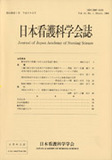Japanese
English
- 販売していません
- Abstract 文献概要
- 参考文献 Reference
要旨
本研究の目的は,家族システムの力(家族の適応力と凝集力)と家族対処行動の関係を分析することである.データ収集は,慢性疾患患児を抱えている家族152名を対象に,日本版Family Adaptability and Cohesion Evaluation Scales IIと家族対処行動に関する質問紙Ⅱの2つの測定用具を用いて行った.分析の結果,以下の事が明らかになった.
1)慢性疾患患児を抱えている家族は,適応力,凝集力ともに低い.
2)統合的対処パターンは,家族の凝集力が高く,負担の認知が高い場合ほど多くとられる傾向がある.
3)方策的対処パターンは,家族の適応力や凝集力と関連性はなく,負担の認知が高いほど多くとられる傾向がある.
4)ノーマリゼーション的対処パターンでは,負担の認知が低く,家族の凝集力が高いほど多くとられる傾向にある.
5)危機対応対処パターンでは,負担の認知が高く,家族の凝集力が低いほど多くとられる傾向にある.
Abstract
The purposes of this study were to identify the family coping strategies among families with chronically ill children and to explore the relationship between the family system (variables), the family burden and the family coping.
One hundred fifty-two families with chronically ill children were studied. The Japanese version of Family Adaptability and Cohesion Evaluation Scales II and the Family Coping Behavior Inventory II were used.
The result were 1) the family cohesion and adaptability in families with a chronically ill child tended to be lower than normal families; 2) the integration coping pattern was positively related with family cohesion and the family burden; 3) the problem solving coping pattern was positively related with the family burden; 4) the normalization coping pattern was negatively related with the family burden and positively related with the family cohesion; 5) the crisis response coping pattern was positvely related with the family burden and negatively related with the family cohesion.
Copyright © 1994, Japan Academy of Nursing Science. All rights reserved.


